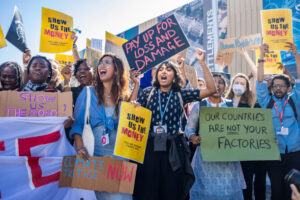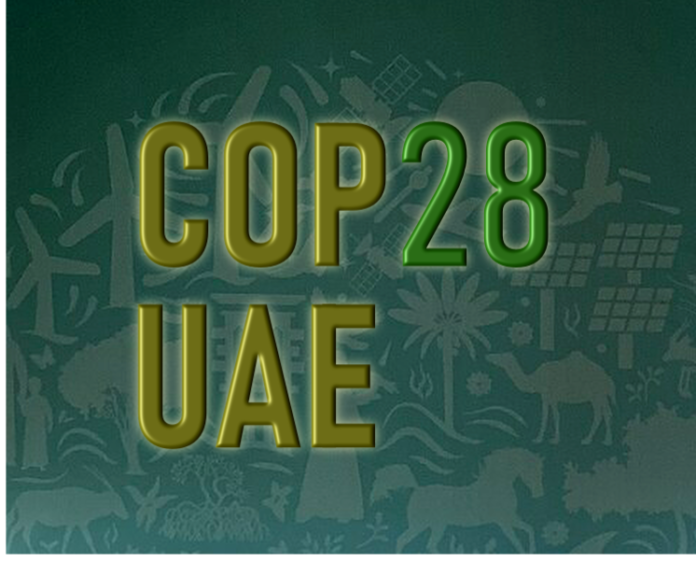COP stands for “conference of the parties”, with parties being the 197 countries that have signed up to the UN climate treaty (UNFCCC) to avoid “dangerous interference” with the climate. Its main areas of focus are preventing climate change (mitigation), adapting to climate change (adaptation), and dealing with the negative impacts of climate change (loss and damage).
In Laudate Deum, Pope Francis recent apostolic exhortation the urgency and seriousness of the climate crisis is clearly stated. “Our responses have not been adequate, while the world in which we live is collapsing and may be nearing the breaking point. (2) Later the document points to the response that is needed. “The necessary transition towards clean energy sources such as wind and solar energy, and the abandonment of fossil fuels, is not progressing at the necessary speed.” (55)
It is no accident that Laudate Deum was published in October 2023, just weeks in advance of the COP28 meeting. The document stresses that not enough is being done to address the climate crisis and that, while every person has a part to play, it is world leaders and Governments that bear the greatest responsibility in mitigating the climate crisis.
Two chapters, numbers 4 and 5, in this document focus directly on the COP Summit process. The first of these acknowledges successes but also highlights the failure of many Summits to achieve progress, to meet deadlines (par 44) and failure to implement agreed funds for adaptation. (par 45) Chapter 4 ends with the following statement; “the accords have been poorly implemented, due to lack of suitable mechanisms for oversight, periodic review and penalties in cases of noncompliance… international negotiations cannot make significant progress due to positions taken by countries, which place their national interests above the global common good”. (par 52)
|
Key issues to watch at COP28 Other critical tasks facing negotiators in Dubai include getting the loss and damage fund (established at COP27) up and running and agreeing on a framework for the Paris Agreement’s global goal on adaptation (GGA). Other issues that are likely to receive much attention, and which may be reflected across several negotiating streams, include energy transition and food systems transformation. And, as is often the case, discussions and negotiations on climate finance are likely to be centre stage. |
The fact that chapter five of Laudate Deum is called “What to Expect from COP28 in Dubai?” is a clear indication of the importance that Pope Francis places on this event. He expresses the hope that COP28 “can represent a change of direction… towards clean energy sources such as wind and solar energy, and the abandonment of fossil fuels”. This core issue of fossil fuels has been an unaddressed elephant in the room for decades.
Laudate Deum is realistic in recognising that whether or not this summit succeeds remains in the balance. “If we are confident in the capacity of human beings to transcend their petty interests and to think in bigger terms, we can keep hoping that COP28 will allow for a decisive acceleration of energy transition, with effective commitments subject to ongoing monitoring. This Conference can represent a change of direction, showing that everything done since 1992 was in fact serious and worth the effort, or else it will be a great disappointment and jeopardize whatever good has been achieved thus far.” (54) Chapter 5 ends by expressing the hope: “May those taking part in the Conference be strategists capable of considering the common good and the future of their children, more than the short-term interests of certain countries or businesses”. (par 60)
For year’s COP Meetings have repeatedly kicked needed climate action down the road and failed to face-up to the core issue phasing out of fossil fuels. Time is running out, the facts speak for themselves. 2023 is shaping up to be the hottest year on record, the last five years have all broken records and extreme weather events, floods and wildfires are increasing yearly. The UN Secretary General summed up what COP28 needs to achieve;
“Leader’s must act immediately to limit global temperature rises to 1.5 degrees, protect people from climate chaos and end the fossil fuel age.”
Achieving these three aims means a rapid reduction in global carbon emissions, compensating poorer countries for damage already suffered, funding them to adapt to climate change and agreement to end use of fossil fuels. All of these aims are reflected in Laudate Deum. In addition this document stresses the urgent need for concerted action to mitigate “the impact of climate change [which] will increasingly prejudice the lives and families of many persons. We will feel its effects in the areas of healthcare, sources of employment,  access to resources, housing, forced migrations, etc.” (2)
access to resources, housing, forced migrations, etc.” (2)
There is a lot at stake in the coming weeks. COP 28 must reach for radical change and a rapid scaling up of global efforts to address the climate crisis. An increasing number of countries want to include an objective to phase out all fossil fuels on the agenda of this COP. This will likely be a central topic for the first time and no doubt a divisive one.
The failure of previous COP agreements to address the needs of poorer nations most effected by climate change has led to their distrust of developed and industrialised countries who ignore global wellbeing and the impact on the poor in favour of their own short-term national interests. To address this, climate justice will need to be at the heart of the negotiations at COP28. It’s time for big decisions and also to put money on the table for adaptation, loss and damage and for rapid transition to renewables. If the Dubai meeting fails to make very significant progress there is a real danger that the COP process will be irreparably damaged and that the cooperative engagement needed to mitigate the climate crisis will be undermined.


You must be logged in to post a comment.